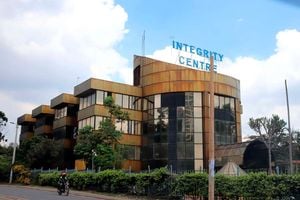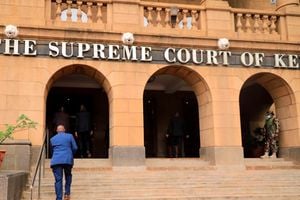
Outgoing LSK President Eric Theuri and his successor Faith Odhiambo at the Rift Valley Sports Club in Nakuru on March 22, 2024 where Ms Odhiambo was sworn in.
There should neither be any surprise or denying that the legal profession in Kenya has suffered a catastrophic collapse in standards. The is because the entire value chain which prepares lawyers has been comprehensively sabotaged at every node, starting from entry into law school.
Once the elite identified law as the only non-STEM field understood, in their vulgar conceit to be sufficiently prestigious for their relatives, the requirement for enrolment into law school was liberalised.
Consequently, the demand for legal studies proved insatiable, and the ‘parallel' degree system was overwhelmingly dominated by the colossal population of law students.University capacity was stretched beyond limits in every possible way.
The curriculum was severely diluted, if not in actual design, then definitely in implementation, as qualified lecturers were hard to come by, and the few available made a killing shuttling between their chambers, consultancies and juggling classes across regions.
Misconduct was rampant: lecturers getting away with ‘missing marks' and students cheating with impunity, with many spaces where they colluded to push matters along.
In view of the debacle that had become liberalised legal education, the Council for Legal Education developed a new curriculum as a remedial standards enforcement measure, and to backstop egregiously lackadaisical university curriculum administration.
However, when the time came, the Kenya School of Law had to confront an inexorable deluge which, predictably, soon overwhelmed it on account of sheer numbers, as well as a high capacity to organise and litigate their way around the exacting curriculum, into enrolment as advocates. As the supervisor of apprenticeships, the CLE in its wisdom reduced the duration of pupilage to six months, with minimum oversight in chambers which have neither the work nor other facilities to support rigorous learning of the business of lawyering.
Where enrollment proceedings used to be conducted twice annually at the maximum, the High Court’s schedule has become a conveyor belt churning out new minted advocates every other week. These brave new fledgling are permitted to practice as sole proprietors almost as soon as their certificate of admission is in hand.
In qualitative terms, the difference between the average advocate and an outright charlatan is purely academic. At the same time, the most salient discourse in the Law Society of Kenya is not concerned about investing the society's resources in developing an aggressive programme to enable members improve their professional capacity, but in applying the funds to extremely obscure enterprises, like, ironically, vigilante sting operations to weed out quacks, devolving funds to parochial chapters, and mobilising to institute monopolies in lucrative fields in the public and private sector.
Arguably, this choice of investment is better than the scandalous investments of the past, when for over a decade, lawyers were required to pay billions for the purchase of a ramshackle bungalow to house the LSK headquarters, or the even egregiously fetid embezzlement conspiracy which was presented as an arbitration centre construction project.
The LSK secretariat has a free hand in the (mis)management of LSK funds, and the council is either inattentive or complicit. Every attempt to initiate a forensic analysis of LSK’s books has been resisted with astonishingly implacable and highly coordinated resistance. Years after Nelson Havi's presidency, we are no closer to having a glimpse of what the Secretariat does with LSK funds and books. Meanwhile, subsequent councils appear to have internalised the wisdom of keeping a wide berth from any matters forensic or accountable, lest the wrath of the Gitanga Road cartels smite them.
Even so, I think it makes a lot of sense for the LSK council to put the secretariat on a shorter leash, and to enforce accountability for the society's resources through the Advocates' Act; mismanaging society funds, or any other form of turpitude and impunity, including arrogance towards members, should be sanctioned as professional misconduct liable for suspension or even striking off the Roll of Advocates.
Secondly, the funds paid by members to LSK in the form of annual practising and continuous professional development fees should not be sequestered in innumerable accounts throughout our banking sector, and squandered arbitrarily. Rather, they are sufficient to finance hundreds of quality annual scholarships to enable interested advocates acquire specialised education or other form of professional development according to their practice needs.
LSK should also collaborate with the Council for Legal Education and major client groups, like the Kenya Bankers Association and the Insurance Association of Kenya, and develop minimum criteria for chambers to qualify for briefs. Decent chambers should have capacity to provide high quality services to clients and provide rigorous apprenticeships to pupils. Such an initiative would create demand-driven incentives for advocates to form, join or work their way into dependable partnerships, and discourage the Kenyan professional tradition of proliferating, eponymous one-man shows.
Restoring the lustre to the legal profession isn’t difficult to implement. But the project entails a choice to pursue integrity and high standards consistently and resolutely. There is no harm in hoping that with a new council comes a new dawn.
Mr Ngéno is an Advocate of the High Court










